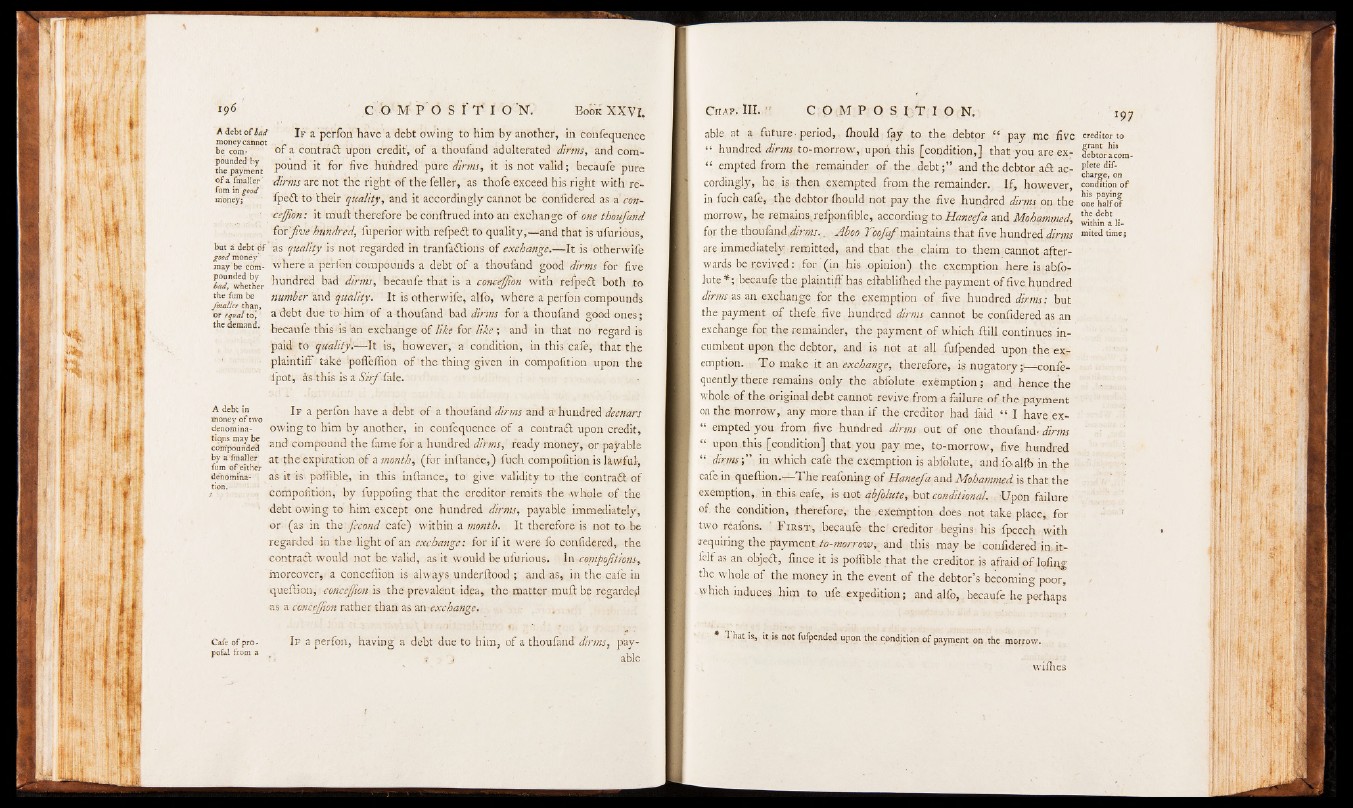
A debt oHad
money cannot
be compounded
by
the payment
o f a fmaller'
fum in good
money;
but a debt of
good money'
may be compounded
by
bad, whether
the fum be
fmaller than,
or equal to,
the demand..
A debt in
money o f two
denominations
may be
compounded
by a fmaller
fum o f either
denomination.
■'
If a perfon have a debt owing to him by another, in confequence
of a contrail upon credit, of a thoufand adulterated dirms, and compound
it for five hundred pure dirms, it is not valid; becaufe pure
dirms are not the right of the feller, as thofe exceed his right with re-
fpedl to their quality, and it accordingly cannot be confidered as a con-
cefjion: it muff therefore be conflrued into an exchange of one thoufand
for'fve hundred, fuperior with refpedt to quality,— and that is ufurious,
as quality is not regarded in tranfaftions of exchange.— It is otherwife
where a perfon compounds a debt of a thoufand good dirms for five
hundred bad dirms, becaufe that is a conceffion with refpedt both to
number and quility. It is otherwife, alfo, where a perfon compounds
a debt due to him of a thoufand bad dirms for a thoufand good ones;
becaufe this-is 'an exchange of like for lik e; and in that no regard is
paid to quality— It is, however, a condition, in this cafe, that the
plaintiff take poffeflion of the thing given in compofition upon the
lpotj Els this is a Sirfddle.
I f a perfon have a debt of a thoufand dirms and a-hundred deenars
owing to him by another, in confequence, of a contradl upon credit,
and compound the fame for a hundred dirms, ready money, or payable
at the expiration of a month, (for inflance,) fuch compofition is lawful,
as it 'is- poflible, in this inflance, to give validity to ,the contra£t of
compofition, by fuppofing that the creditor remits the -whole of the
debt owing to him except one hundred dirms, payable immediately,
or (as in the fecand cafe) within a month. It therefore is not to be
regarded in the light of an exchange: for if it were fo confidered, the
contrail would not be valid, as it would be ufurious. In- cempqfitions,
moreover,- a conceffion is always underflood ; and as, in the cafe in
queflion, -conceffion is the prevalent idea, the matter mull be regarded
as a conceffion rather than as an-exchange.
If a perfon, having’ a debt due to him, of a thoufand' dirms, pay-
t 'i able
Cafe o f pro -
pofal from a
able at a future-period,- fhould lay to the debtor “ pay me five creditor to
“ hundred dirms to-morrow, upon this [condition,] that you are ex: S o r a c om -
“ empted from the remainder of the debt;” and the debtor a& ac- P)etedifj*
1 _ 1 . charge, on cordingly, ne i$,< then exempted from the remainder. If", however, condition of
in fuch cafe, the debtor fhould riot pay the five hundred dirms on the one half of
morrow, he remains-,refponfible, according to Haneefa and Mqhqmtned,
for the thoufand,dirms.. Aboo Yoofqf maintains that fiye hundred dirms noted time;
are immediately remitted, and that. the. claim to them cannpt afterwards
be revived : for (in his opinion) the exemption here is abfo-
lute *; becaufe the plaintiff has eflablifhed the'payment of five hundred
dirms^s, an exchange for the exemption of five, hundred dirms: but
the payment of thefe. five hundred dirms cannot be confidered as an
exchange for the remainder, the payment of which Hill continues incumbent
upon the debtor, and is not at all fufpended upon the ex.-
emption. To make it an exchange, therefore, is nugatory;—confe-
quently there remains only the abfolute exemption; and hence the
whole of the original debt cannot revive from a failure of the payment
on the morrow, any more than if the creditor had faid “ I .have’ex-
“ empted you from five hundred dirms out of one thoufand -dirms
“ upon.this [condition] that you pay me, to-morrow, five hundred
“ dirms f in which cafe the exemption is abfolute, and.fo.alfb in the
cafe in queflion.- The reafoning of Haneefa and Mohammed is that the
exemption,, in this, cafe, is not- abfolute, but conditional. . -Upon failure
of the condition, therefore, the .exemption does ,not take place, for
two reafons. I F irst-, becaufe the'creditor begins his fpeech with
requiring the payment to-morrow, and this may be confidered in.it-
felfas an objeft, fince it is poflible that the creditor, is afraid of'loling
the, whole of the money in the event of the debtor’s becoming poor,
which induces him to ufe expedition; and alfo,.becaufe he perhaps
* l hat is, it is not fufpended upon the condition of payment on the morrow.
wifhes